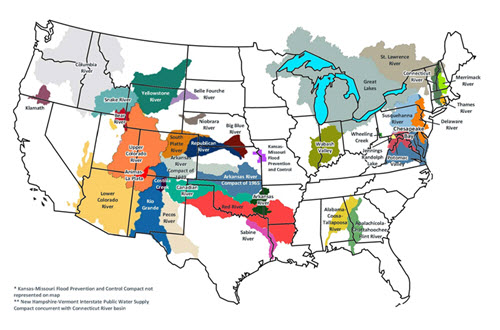SCOTUS Wades into Water Wars
On January 8, the Supreme Court of the United States (“SCOTUS”) heard back-to-back oral arguments in two major water rights disputes between states: Texas v. New Mexico and Colorado, [1] and Florida v. Georgia. [2] While the merits of these cases differ significantly, the outcomes could have substantial consequences for water users in, and around, the affected states and potentially wide-ranging effects on future water rights disputes.
Case Summaries
Texas v. New Mexico and Colorado
In 2013, Texas filed an original jurisdiction action with the Court alleging that New Mexico’s increasing water use and groundwater pumping deprives Texas of water apportioned to it under the 1938 Rio Grande Compact (“Compact”). The Compact apportions waters of the Rio Grande between Colorado, New Mexico, and Texas. Specifically, the Compact mandates the diversion of a certain amount of water to New Mexico’s Elephant Butte Reservoir. The dispute focuses on the flow of water from the Elephant Butte Reservoir. Texas says such water must be allowed to flow unimpeded through southern New Mexico and into Texas, but that New Mexico is illegally diverting water before it crosses the border by allowing both surface water diversion and groundwater extraction. For example, farmers pump groundwater hydrologically connected to the Rio Grande River to farm cotton, pecans, onions, and chilies. [3]
The United States moved to intervene, and New Mexico filed a motion to dismiss the claims of both Texas and the United States. The SCOTUS Special Master assigned to the case recommended that the Court deny the motion to dismiss the Texas complaint “but grant New Mexico’s motion to dismiss the United States’ Complaint in Intervention to the extent it fails to state a claim under the 1938 Compact.” A copy of the Special Master’s Final Report can be found here.
The question presented to the Court is whether the United States can assert claims under the Compact or whether it can only assert claims based on the 1906 Convention between the United States and Mexico for Equitable Distribution of the Waters of the Rio Grande for Irrigation Purposes. In essence, the critical issue is whether the United States can bring independent claims under an interstate water compact.
Florida v. Georgia
Florida v. Georgia is the latest chapter in a long-running dispute among Florida, Georgia, and Alabama over allocation of water in the Apalachicola-Chattahoochee-Flint ("ACF") River Basin. [4] Both Georgia and Florida rely on water from the ACF for a variety of purposes. Notably, Georgia relies on the ACF River Basin for potable water for Atlanta’s growing population, and Florida relies on the water to maintain its seafood industries in Apalachicola Bay. The U.S. Army Corps of Engineers (“Corps”) operates a reservoir system that effectively regulates water flow along the Chattahoochee River from Georgia to Florida. After decades of unsuccessful negotiations and litigation, Florida filed an original jurisdiction action against Georgia with the Court in 2013, requesting an equitable distribution of water from the ACF River Basin. Florida claims that Georgia’s increasing water usage harms Apalachicola Bay and the Florida seafood industry because Georgia diverts too much water from the river system. Georgia has argued that any limits on its water use will undermine its economy, including the growth of the Atlanta metro region and the state’s agriculture industry in southeastern Georgia.
In a report submitted to the Court in February 2017, the Special Master found that “Florida points to real harm and, at the very least, likely misuse of resources by Georgia,” but still recommended that the Court deny Florida’s request for relief. Because Florida’s water levels largely depend on dams operated by the Corps, and because the Corps declined to be a party to the suit, the Special Master concluded that Florida did not show that a cap on Georgia’s water use would remedy its problem. This was one of the central issues during oral argument, raised several times by the justices who questioned whether the record truly showed that a consumption cap in Georgia would result in a meaningful increase in Florida’s water supply. Additionally, the justices questioned whether the benefit to Florida would be greater than the cost to Georgia, and which state bore the burden of proving that balance. [5]
Role of the Federal Government
In both cases, the federal government plays an important but contrasting role. In Texas v. New Mexico and Colorado, the United States sought to be an active participant in the litigation. In its Complaint in Intervention, the United States alleged that “New Mexico has allowed the diversion of surface water and the pumping of groundwater that is hydrologically connected to the Rio Grande downstream of Elephant Butte Reservoir by water users who either do not have contracts with the Secretary [of the Interior] or are using water in excess of contractual amounts” in violation of federal reclamation law. [6] The United States also asserts that New Mexico’s water diversions interfere with the United States’ contractual obligations to deliver water to its consumers, including to Mexico under the Convention of 1906. [7]
At oral argument, both the United States and Texas asserted that the United States’ claims against New Mexico could go forward even if Texas’s complaint was dismissed. Specifically, Scott Keller, the Solicitor General of Texas, argued that the “U.S. can raise its own compact claims because the compact creates a statutory duty for the U.S. to distribute water to Texas. This statutory duty arises from three key facts. First, the U.S. owns and operates the Rio Grande Project. Second, that project is a necessary predicate for the compact’s equitable apportionment …. And, third, that project is the sole means to actually distribute the equitable apportionment to Texas.” [8]
By contrast, in Florida v. Georgia, the federal government stayed on the sidelines, declining to join as a formal party. During oral arguments, the Justices seemed concerned that the United States would not take a bigger role in the case. Justice Breyer asked the attorney for the United States: “why don’t you just waive the sovereign immunity, get into this, and try to help the Special Master reach an equitable solution?” [9] Justice Kennedy also expressed frustration, noting: “You say, well, whatever you decide we’ll use our expertise to follow it,’ but then you don’t tell us what to decide and you’re the experts.” [10]
Potential Impacts
Decisions on these cases are expected by June.
If SCOTUS holds in Texas v. New Mexico and Colorado that the United States has an independent cause of action under the Rio Grande Compact, it could open the door for the federal government to sue states for violating the terms of other interstate water compacts. [11] Depending on the scope of the ruling, it could either set a precedent for claims by the United States in other interstate water disputes or be narrowly limited to the facts of the case. Included at the end of this alert is a map showing all current interstate compacts.
From a practitioner’s perspective, the issues at the crux of Florida v. Georgia highlight the need for clear guidance from technical experts in determining priorities in complex allocations. Moreover, the decision will have implications for how SCOTUS may handle equitable apportionment in future water disputes, such as between Mississippi and Tennessee. [12] There is a dearth of recent case law on equitable apportionment, particularly in Eastern states; the last time SCOTUS equitably apportioned water between Eastern states was 1931, when it resolved a conflict between New Jersey and New York. [13] There also is a lack of precedent as to how the Court will treat considerations of ecological impacts in equitable apportionment. Whether the decision in Florida v. Georgia will provide clear insights into these issues remains to be seen, but if it does, it will certainly impact upcoming interstate water disputes.
Conclusion
The allocation of water from interstate compacts directly impacts the amount of water available to users within the party states. Thus, the outcome of these two cases apportioning water between and among states, and deciding the role of the federal government in that distribution, will have impacts across various economic sectors, including agriculture, power production, municipal water supply, food processing, technology manufacturing, and data storage, to name a few.
We will continue to monitor these cases and provide updated analysis of the decisions once issued.
This map was created by K&L Gates to illustrate the interstate water compacts listed on the National Center for Interstate Compact’s website, http://apps.csg.org/ncic/SearchResults.aspx?&category=2. Click on map to view larger version.
[1] Texas v. New Mexico and Colorado, No. 220141 (U.S. filed Jan. 1, 2013).
[2] Florida v. Georgia, No. 220142 (U.S. filed Oct. 1, 2013).
[3] See e.g. Natalie Krebs, At War Over Water: Texas and New Mexico Will Face Off Next Week at the Supreme Court, TEXAS STANDARD (Jan. 2, 2018), http://www.texasstandard.org/stories/at-war-over-water-texas-and-new-mexico-will-face-off-next-week-at-the-supreme-court/; Laura Paskus, Next Stop for Texas-NM water dispute: Supreme Court, NM POLITICAL REPORT (Feb. 10, 2017), http://nmpoliticalreport.com/151659/next-stop-for-texas-nm-water-dispute-supreme-court/.
[4] The dispute over the ACF is not only being fought in the Supreme Court. In April 2017, three environmental groups filed suit in a D.C. federal court challenging the environmental impact statements used to update the Corps’ plan to manage the ACF, which could reduce even further the water flowing into Florida. Carolina Bolado, Enviro Groups Sue Army Corps Over Water Plan for Fla., Ga., LAW 360 (April 27, 2017), https://www.law360.com/articles/918045?scroll=1
[5] Oral Argument at 7:2-8, Florida v. Georgia (No. 142, Orig.), https://www.supremecourt.gov/oral_arguments/argument_transcripts/2017/142-orig_h3cj.pdf; see also Laura Fowler, Argument analysis: Can Florida’s needs for more water be ‘redressed’ by a consumption cap in Georgia? SCOTUSBLOG (Jan. 9, 2018), http://www.scotusblog.com/2018/01/argument-analysis-can-floridas-needs-water-redressed-consumption-cap-georgia/.
[6] Report by Special Master A. Gregory Grimsal, Texas v. New Mexico, No. 141, Orig. (Feb. 9, 2017), https://www.tceq.texas.gov/assets/public/agency/statements/2-9-17-special-master-report.pdf p.6
[7] Id.
[8] Oral Argument at 21:6-17, Texas v. New Mexico and Colorado (No. 141, Orig.), https://www.supremecourt.gov/oral_arguments/argument_transcripts/2017/141-orig_c07d.pdf
[9] Oral Argument at 60:6-9, Florida v. Georgia (No. 142, Orig.), https://www.supremecourt.gov/oral_arguments/argument_transcripts/2017/142-orig_h3cj.pdf
[10] Oral Argument at 66:14-17, Florida v. Georgia (No. 142, Orig.), https://www.supremecourt.gov/oral_arguments/argument_transcripts/2017/142-orig_h3cj.pdf
[11] NATIONAL CENTER FOR INTERSTATE COMPACTS (Jan. 17, 2018), http://apps.csg.org/ncic/SearchResults.aspx?&category=2
[12] Mississippi v. Tennessee, No. 220143 (U.S. filed June 1, 2014).
[13] New Jersey v. New York, 283 U.S. 336 (1931).
This publication/newsletter is for informational purposes and does not contain or convey legal advice. The information herein should not be used or relied upon in regard to any particular facts or circumstances without first consulting a lawyer. Any views expressed herein are those of the author(s) and not necessarily those of the law firm's clients.







